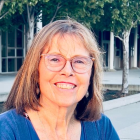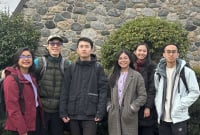These in-their-own-words pieces are told to Patricia Lane and co-edited with input from the interviewee for the purpose of brevity.
Karishma Porwal uses her influence with millions of TIkTok and Instagram users to link their day-to-day concerns to the climate crisis.
Tell us about your project.
I make short social media videos connecting trending topics to the climate crisis. They generally encourage a hopeful perspective and often encourage viewers to take action. Apparently, people like them!
I was heartbroken after the Jasper fires. Some places I had camped were burned to cinders. I created a montage using my photos of pristine areas side by side with the burned landscape. I invited viewers to contrast these with pictures of the illusory “damage” done by Just Stop Oil protesters who threw paint at screens protecting paintings. That post has well over two million views. Some of the 2,000 comments that said things like, “Thanks! I get it now!” or “OK I see your point,” have tens of thousands of “likes.”
I often use storytelling. I created a "bedtime story" explaining the collapse of the North Atlantic cod fishery, so viewers understand the consequences of taking more than we need. The Doug Ford Greenbelt scandal was very complex to explain in words, so I made a "fairy tale" making it understandable. Parents said it helped their kids. Teachers like them, too. I can see that my work helps people who were confused, and therefore disengaged, make sense of the politics.
How did you get into this work?
During the lockdown, I learned how to write scripts and make videos that people want to watch. The early ones reflected my beliefs at the time that we can all make a difference as consumers. But my masters’ degree in sustainability leadership helped me see our importance as citizens taking collective action. Now, I often make videos naming the oil, gas, and coal industries as the real culprits.
What makes it hard?
The video I did explaining the Keeling curve attracted hundreds of thousands of people and thousands of comments, many of which were insulting. One even claimed I was the illegitimate child of Al Gore! It is hard to see such cavalier disregard for our beautiful Earth. But it also made space for folks with legitimate questions, such as, “What does that have to do with the weather?" I have just released one explaining exactly that.
What gives you hope?
Stories of change. Sometimes, I will just celebrate a small win. Recently, here in Kitchener, we got our night bus back. It seems like a small thing but affordable, safe transportation matters a lot to students and workers who travel after 10 p.m. and others who want to enjoy downtown in the evening. And of course, more public transit means less cars. I made a video of the inaugural ride of the route and celebrated with the young, undergraduate, urban planning students and other riders as we gave the drivers high fives and partied on the buses. It shows viewers that climate victories come in small and large sizes and all are worth celebrating. You might not be able to do much about the Amazon burning, but if you work with your neighbours, you can get a night bus.

How do you think the way you were raised affected you?
My maternal grandmother lives her life secure in her understanding that happiness comes from a connection with others and the natural world. My parents always supported me. When they saw my interest in nature, they gifted me a subscription to National Geographic Kids. I learned that leatherback turtles were endangered and was so upset that I put up posters in every room in my house! After my undergraduate degree, I got a traditional corporate job working for a pharmaceutical company.
One day, I just quit. I told my parents I wanted my work to align with my values. They told me they believed in me and I should believe in myself. I went back to school to begin my new path. Now, my day job is with Environmental Defence working on water and transit, and I spend my free time on this project. I am so grateful for them.
What would you like to say to other young people?
Look around. If you don't like the bus system or want more parks, there will be a group working on it. Join them and add your energy and your voice. You will find community, hope and new adventures.
How about older readers?
Be brave with your fellow elders. We need them. If you approach them with a shared wish to protect your grandchildren, things will go well.
Karishma Porwal lives in Kitchener, Ontario. More than 80,000 people follow her on Instagram. Her posts have more than 4 million views on Tiktok.






Comments
You go girl!
Tell it like it is,
because a lot of people are out there telling it like it isn't.
I can imagine that Karishma Porwal likely gets a lot of push back from climate change deniers. From my experience following others who tell the reality of climate change and how this is impacting the world, you see the same core group disputing the message and pushing disinformation.
Karishma, keep it up, ignore the deniers.